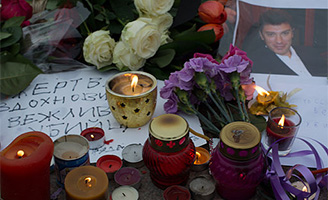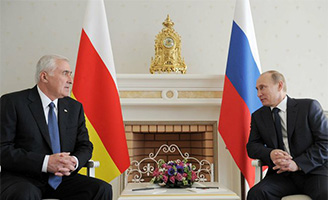Georgia’s Former Defense Minister Blames Government for Damaging State Interests
By Eka Janashia (04/15/2015 issue of the CACI Analyst)
On April 3, former Defense Minister Irakli Alasania claimed that Georgia’s government thwarted a crucially important defense deal with France likely due to Russia’s objection to Georgia’s enhanced defensive capabilities.
According to Alasania, French President François Hollande agreed during his visit to Tbilisi last year to sell air defense capabilities to Georgia. The move marked the end of an arms embargo informally imposed against Georgia after the 2008 August war as western partners hesitated to sell defensive weapons to the country.
The government worked out subsequent proposals and tasked Alasania with striking an initial deal – a non-binding memorandum of understanding (MoU) – with the French side. He arrived in Paris in late October, but was just before the signing of the document deprived of his mandate to do so. Alasania asserts that Billionaire Bidzina Ivanishvili decided to prevent the deal under pressure from the Kremlin.
The MoU envisaged the conclusion of a final agreement at the end of March, which would aim to reinforce Georgia’s air defense system and shield the country from attacks of fighter aircraft and even short and medium-range ballistic missiles. The deal also foresaw specific training to familiarize the Georgian servicemen with the system. Importantly, the deal would be paid for through a long-term loan, which would not have been painfully reflected in the state budged, the former minister said.
As Alasania refused to comply with the “illegal instruction,” of the “informal ruler [Ivanishvili],” the ministry’s general staff officials were arrested to raise the pressure on him. Nevertheless, Alasania signed the document in order not to lose the chance that “opened up for Georgia after many years of embargo.”
Shortly thereafter, he was sacked from the post of Defense Minister and his Our Georgia-Free Democrats (OGFD) party left the Georgian Dream (GD) ruling coalition. Yet Alasania has not disclosed the MoU-related sensitive details until now (see the 11/11/2014 issue of the CACI Analyst).
The government made efforts to reject Alasania’s allegations. On the same day, PM Irakli Gharibashvili indicted him for exposing state secrets and the Ministry of Defense released an interview with the French ambassador saying that discussions on military cooperation between Georgia and France military, which started last year, were still underway.
However, it remains a fact that the final agreement, allegedly envisaged in the MoU, was not signed at the end of March, 2015. OGFD requests the formation of an ad hoc parliamentary commission with access to classified information to cast light on the issue and confirm or deny the assertions that Alasania made on April 3.
It seems that Alasania has been awaiting the government’s failure to meet the deadline to raise the matter. However, there could be another reason why he raised the criticism at this time.
On April 1, the U.S. NGO International Republican Institute (IRI) published the results of public opinion research conducted throughout Georgia on February 3-28, 2015. The survey mapped the foreign and domestic policy preferences as well as the ratings of political parties and their leaders.
A clear trend unveiled by the polls is the waning popularity of GD. In local elections held in June 2014, the coalition garnered just over 50 percent of the votes, while according to IRI research, the likely number of GD voters has dropped to 36 percent. It is followed by United National Movement (UNM) with 14 percent, OGFD with 10 percent, Labor Party with 6 percent, Alliance of Patriots of Georgia and Democratic Movement–United Georgia with 5 percent each. Alasania’s favorability rating is 57 percent, with a disapproval rating at 34 percent, while the corresponding figures for PM Gharibashvili are 56/39 percent respectively. Alasania is the most favored candidate among the opposition leaders.
In terms of foreign policy priorities, the poll showed that Georgians strongly support their country’s integration with Euro-Atlantic structures. 85 percent of the respondents favor Georgia’s membership in the EU and 78 percent support its accession to NATO. 76 percent of Georgians deem the Russian Federation as a threat to the country while 88 percent think Russian aggression toward Georgia is ongoing or likely to resume.
Another striking trend disclosed by the survey is the apathy and skepticism that has been growing among the population since 2014. People are less optimistic about the future than a year ago. 55 percent of the respondents think Georgia is on the wrong track, and only 25 percent approve the country’s current trajectory.
Although GD, as well as some experts and politicians, expressed skepticism regarding the polls, it might be a mistake to ignore the overall context that the survey has outlined. What is a warning for the ruling coalition might be an opportunity for the opposition parties. Talking about the air defense affair, while most Georgians fear continued Russian aggression, is beneficial to Alasania and OGFD. This shift in opinion is also reflected in the declining support for GD and the growing popularity of Alasania.
CACI Analyst, March 18, 2015
CACI Analyst, March 18, 2015 (.pdf)
Contents
Analytical Articles
TURKMENISTAN POISED FOR TAPI BREAKTHROUGH, by Micha'el Tanchum
NEMTSOV'S ASSASINATION AND THE CHECHEN TRACE, by Emil Souleimanov
RUSSIA TO STRIP ABKHAZIA AND SOUTH OSSETIA OF THEIR LIMITED SOVEREIGNTY, by Valeriy Dzutsev
ARMENIA'S RULING PARTY CONSOLIDATES POWER, by Armen Grigoryan
Field Reports
KYRGYZ CRIME BOSS MURDERED IN MINSK, by Arslan Sabyrbekov
GEORGIA FACES ECONOMIC CRISIS, by Eka Janashia
TAJIKISTAN'S ELECTIONS EXPEL OPPOSITION FROM PARLIAMENT, by Oleg Salimov
ARMENIA TO PARTICIPATE IN BAKU 2015 EUROPEAN GAMES, by Mina Muradova
Nemtsov’s Assassination and the Chechen Trace
By Emil Souleimanov (03/18/2015 issue of the CACI Analyst)
After the murder on February 27 of Russian opposition leader Boris Nemtsov, a group of Chechens allegedly led by a former kadyrovets, have become the main suspects of the ongoing investigation. Whatever the outcome of the trial, the “Chechen factor” in general and Ramzan Kadyrov’s increasing role in Russia's internal and external affairs in particular, seem to establish a pattern that could leave an imprint on Russian politics for years to come.

Russia to Strip Abkhazia and South Ossetia of their Limited Sovereignty
By Valeriy Dzutsev (03/18/2015 issue of the CACI Analyst)
Russia has moved to sign an agreement with South Ossetia, emulating a similar, earlier agreement with Abkhazia. Moscow proposes to eliminate border controls with the two de facto states and essentially annex them in exchange for financial incentives. Despite their inherent weakness, political forces exist in both territories that oppose covert annexation to their large neighbor. Most recently, South Ossetia’s parliament and government clashed over how closely the territory should integrate with Russia. Authorities in Abkhazia and South Ossetia seek to reassure their disgruntled citizens that their countries will retain sovereignty although this aim now appears more illusory than ever.

CACI Analyst, March 3, 2015
CACI Analyst, March 4, 2015 (.pdf)
Contents
Analytical Articles
KAZAKHSTAN AND THE EEU, by Dmitry Shlapentokh
U.S. NEW SILK ROAD INITIATIVE NEEDS URGENT RENEWAL, by Richard Weitz
IS “TURKISH STREAM” A SERIOUS THREAT TO THE TRANS-CASPIAN PIPELINE?, by Juraj Beskid, Tomáš Baranec
CASA-1,000 – HIGH VOLTAGE IN CENTRAL ASIA, by Franz J. Marty
Field Reports
KYRGYZSTAN’S RESIGNED PROSECUTOR-GENERAL GIVES WORRYING PRESS CONFERENCE, by Arslan Sabyrbekov
MOSCOW PLEDGES TO COUNTERACT GEORGIA’S INTEGRATION WITH NATO, by Eka Janashia
ARMENIA TOUGHENS ITS STANCE AGAINST TURKEY, by Erik Davtyan
FOREIGN MINISTERS OF TURKEY, AZERBAIJAN AND TURKMENISTAN DISCUSS ENERGY AND TRANSPORTATION IN ASHGABAT, by Tavus Rejepova




